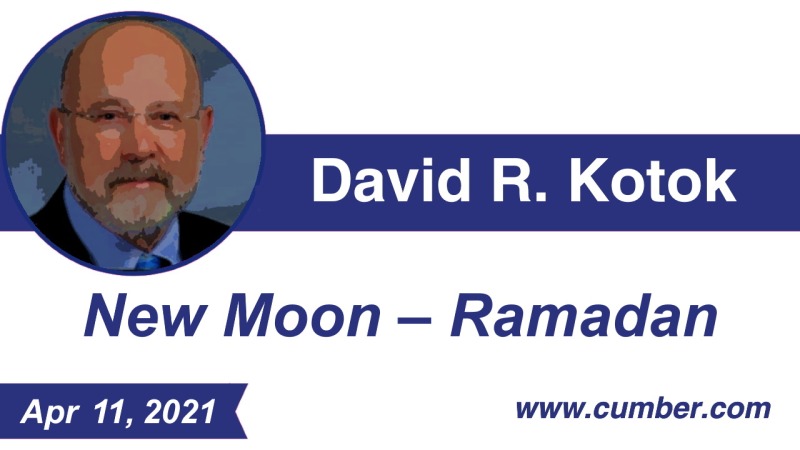“Sunday night, April 11, 2021, at 10:31 PM EDT, will be the new Moon, when the Moon passes between the Earth and the Sun and will not be visible from the Earth. The day of or the day after the New Moon marks the start of the new month for most lunisolar calendars. In the Hebrew calendar, sundown on Sunday, April 11, 2021, will mark the start of Iyar. The third month of the Chinese year of the Ox starts on Monday, April 12, 2021 (at midnight in China's time zone, which is 12 hours ahead of EDT).

“In the Islamic calendar the months start with the first sighting of the waxing crescent Moon. Many Muslim communities now follow the Umm al-Qura Calendar of Saudi Arabia, which uses astronomical calculations to start the months in a more predictable way (intended for civil and not religious purposes). Because of its religious significance, Ramadan is one of 4 months in the Islamic year where the start of the month is updated in the Umm al-Qura Calendar based upon the actual sighting of the crescent Moon. This calendar predicts the holy month of Ramadan may start with sunset on Monday, April 12, 2021; but the actual start will be adjusted based on observations of the crescent Moon. Ramadan is honored as the month in which the Quran was revealed. Observing this annual month of charitable acts, prayer, and fasting from dawn to sunset is one of the Five Pillars of Islam.”
(“The Next Full Moon is the Worm Moon [and, By Some Definitions, a Supermoon],” https://solarsystem.nasa.gov/news/1771/the-next-full-moon-is-the-worm-moon-and-by-some-definitions-a-supermoon/)
Readers of our two previous Sunday missives, “Rembrandt Pairing” (https://www.cumber.com/market-commentary/rembrandt-pairing) and “Ten Plagues” (https://www.cumber.com/market-commentary/ten-plagues-covid), asked about Ramadan.
The month of Ramadan originates with instructions in Sura 2 of the Koran. This is the longest of the Suras, according to the 1958 edition from Heritage Press, translation of the Arabic by Arthur Jeffrey. I will leave it to readers to research the traditions attached to this ninth month of the Muslim calendar. This month of fasting and prayer started in the 7th century. Some adherents to Islam read the entire Koran during the month, which ends with the new crescent moon that marks the opening of month ten. Ramadan concludes with Eid al-Fitr, or the Festival of Fast-Breaking, one of the two major religious holidays in Islam.
Adherents to Islam constitute the world’s second largest religious group (1.9 billion people). Only Christianity is larger, with 2.4 billion adherents. Islam is the official religion in 26 countries.
We’ll watch for the crescent moon after tonight to mark the start of the lunar month and observe the month’s end with the next crescent moon on May 11.
For me, these three recent Sunday missives have made for a stimulating digression, reading and thinking about faith and traditions represented by three men – Jesus, Muhammad, and Moses – and their roles in defining history for over half of our planet.
For a full and fascinating discussion of all things lunar, we recommend the following site (which we also quoted above): “The Next Full Moon is the Worm Moon (and, By Some Definitions, a Supermoon),” https://solarsystem.nasa.gov/news/1771/the-next-full-moon-is-the-worm-moon-and-by-some-definitions-a-supermoon/.
We wish readers Salaam, Shalom, Peace.
David R. Kotok
Chairman of the Board & Chief Investment Officer
Email | Bio
Links to other websites or electronic media controlled or offered by Third-Parties (non-affiliates of Cumberland Advisors) are provided only as a reference and courtesy to our users. Cumberland Advisors has no control over such websites, does not recommend or endorse any opinions, ideas, products, information, or content of such sites, and makes no warranties as to the accuracy, completeness, reliability or suitability of their content. Cumberland Advisors hereby disclaims liability for any information, materials, products or services posted or offered at any of the Third-Party websites. The Third-Party may have a privacy and/or security policy different from that of Cumberland Advisors. Therefore, please refer to the specific privacy and security policies of the Third-Party when accessing their websites.
Sign up for our FREE Cumberland Market Commentaries
Cumberland Advisors Market Commentaries offer insights and analysis on upcoming, important economic issues that potentially impact global financial markets. Our team shares their thinking on global economic developments, market news and other factors that often influence investment opportunities and strategies.

